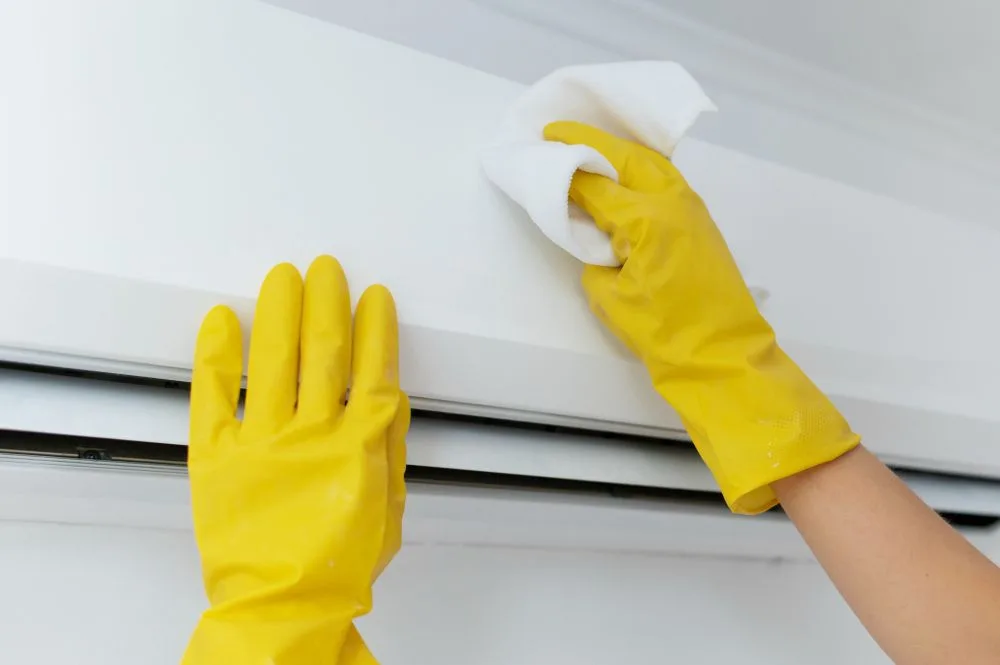Are you searching for ways to extend your AC units lifespan while ensuring a consistently cool home? Maintaining your air conditioning system not only enhances its longevity but also optimizes its cooling performance. By executing simple yet effective practices, you can significantly prolong your AC unit’s life and enjoy a comfortably cooled environment.
This article explores practical tips and essential maintenance routines that will help you safeguard your AC unit, prevent potential issues, and ensure your home remains refreshingly cool throughout the seasons. Embrace these basic yet impactful strategies to maximize your AC unit’s efficiency and durability.
Understanding the Anatomy of an AC Unit
Understanding the anatomy of an AC unit is essential for proper maintenance and troubleshooting. An AC system comprises various components that work together to provide cooling comfort in your home or building. Here’s an overview of the main parts and their functions:
- Evaporator Coil
Located inside the home within the air handler unit or furnace, it cools indoor air as warm air passes over it. The coil contains a refrigerant that absorbs heat, cooling the air before distributing it through the ductwork.
- Condenser Coil
Positioned in the outdoor unit, it releases the heat absorbed by the refrigerant indoors. The condenser coil facilitates the heat exchange process, allowing the refrigerant to change from a gas to a liquid state.
- Compressor
In part of the outdoor unit, the compressor spreads refrigerant between the evaporator and condenser coils, maintaining the refrigeration cycle. It pressurizes the refrigerant, enabling heat transfer.
- Refrigerant Lines
These lines connect the indoor and outdoor units, transporting refrigerant to facilitate the heat exchange process. The refrigerant cycles between the coils, absorbing and releasing heat.
- Expansion Valve
Positioned near the evaporator coil, this valve handles the flow of refrigerant into the evaporator, controlling its pressure and temperature. It allows the refrigerant to expand before entering the evaporator.
- Air Handler
The component is responsible for circulating conditioned air throughout the home. It contains the evaporator coil, blower motor, and filter, ensuring proper air distribution and filtration.
- Ductwork
The network of ducts distributes cooled or heated air throughout the home. Insulated ducts maintain the air’s temperature as it travels from the HVAC system to various rooms.
- Thermostat
Acts as the control center for the HVAC system, allowing users to set desired temperatures. It regulates when the system turns on and off to maintain the desired indoor climate.
The Importance of Regular Maintenance
Regular maintenance is crucial for securing the longevity and efficient operation of your AC system. By implementing routine check-ups and servicing, you can prevent potential issues, maintain optimal performance, and extend your AC units lifespan. Here’s why regular maintenance is essential:
- Enhanced Efficiency
Regular maintenance, including cleaning or replacing air filters, checking coils, and inspecting refrigerant levels, helps maintain optimal performance. When your system operates efficiently, it consumes less energy, leading to lower utility bills. This efficiency also plays a pivotal role to extend your AC units lifespan.
- Prevention of Breakdowns
Routine maintenance plays a vital part in identifying and addressing minor issues before they become major problems. Detecting and fixing small issues early can prevent unexpected breakdowns, reduce the need for costly repairs, and significantly extend your AC units lifespan.
- Extended Lifespan
By keeping the components clean and in good condition, routine maintenance prevents premature wear and tear. This proactive care significantly extends the overall life of the unit. Regular checks and servicing help maximize the operational years of your AC unit.
- Improved Air Quality
Regular servicing, which includes cleaning or replacing filters, clearing dust and debris, and ensuring proper airflow, results in better indoor air quality. This cleaner environment reduces strain on the system, contributing to a healthier and longer life for your AC unit.
- Cost Savings
While maintenance might seem like an added cost, it’s an investment that pays off in the long run. Preventing major issues through regular check-ups not only saves on immediate repair expenses but also extends your AC unit’s lifespan.
DIY Maintenance Tips for the Homeowners
Homeowners can take several DIY maintenance steps to ensure their air conditioning system operates efficiently and lasts longer. Here are some practical tips:
- Regular Filter Cleaning/Replacement
Air filters trap dust and debris, affecting airflow and efficiency. Clean or replace filters every 1-3 months, leaning on usage, to maintain optimal airflow and improve efficiency. This simple task significantly extends your AC unit’s lifespan.
- Keep Outdoor Unit Clear
Ensure the outdoor unit (condenser) remains free from debris, leaves, and obstructions. Regularly clean around the unit and trim vegetation to maintain proper airflow, which is vital for the unit’s longevity.
- Inspect and Clean Coils
Over time, dirt can gather on the evaporator and condenser coils, hindering heat transfer. Utilize a soft brush or vacuum to gently clean these coils. Ensuring they’re clean and unobstructed can extend your AC units lifespan.
- Check and Maintain Refrigerant Levels
Low refrigerant levels, often caused by leaks or improper charging, significantly impact system efficiency. The U.S. Department of Energy emphasizes refrigerant leaks as a common AC issue. Professional inspection is crucial, but monitoring changes in cooling efficiency allows for timely intervention, preventing further damage and extending your AC unit’s lifespan
- Inspect and Clean Drainage
Ensure condensate drains are clear of clogs or blockages. A clogged drain can direct water damage and affect the system’s efficiency and lifespan.
- Seal Ductwork
Leaky ducts waste energy and reduce cooling efficiency. Inspect ductwork and seal any leaks using foil tape or mastic sealant. This helps maintain proper airflow and improves the overall efficiency of the system, ultimately extending your AC unit’s lifespan.
When to Call a Professional
Understanding when to call a professional HVAC technician for air conditioning issues is crucial to prevent further damage and ensure optimal performance. Here are signs indicating it’s time to seek professional help:
- Insufficient Cooling
If your AC unit isn’t providing sufficient cooling despite regular maintenance and filter changes, it may indicate a more complex issue like a malfunctioning compressor or low refrigerant levels.
- Unusual Sounds or Odors
Strange noises such as grinding, banging, rattling, or hissing should not be ignored. Foul odors or burning smells coming from the unit could signal electrical issues or mold/mildew buildup.
- Poor Airflow
Weak or inconsistent airflow from vents could be due to ductwork issues, a failing blower fan, or blocked air filters. It’s essential to address this to maintain proper airflow throughout your home.
- Leaks or Moisture Buildup
Water leaks around the unit or excess moisture inside your home near the AC unit could indicate a condensate drain blockage or refrigerant leakage, both of which require professional attention.
- Constant Cycling On and Off
Short cycling, where the AC frequently turns on and off without completing a full cooling cycle, might stem from thermostat problems, clogged filters, or low refrigerant levels.
- High Energy Bills
A sudden jump in energy bills without a shift in usage patterns could indicate an inefficiently operating AC system. An HVAC professional can identify the issue causing increased energy consumption.
Energy-Efficient Practices for Extended AC Life

Maintaining energy-efficient practices not only helps in reducing electricity bills but also contributes to extend your AC units lifespan. Here are some energy-efficient practices to consider:
- Optimal Thermostat Settings
Set your thermostat to an efficient temperature (around 78°F or higher) when you’re at home and slightly warmer when you’re away. Programmable or smart thermostats allow automatic adjustments, optimizing energy usage.
- Regular Maintenance
Schedule routine maintenance at least annually with an HVAC professional to extend your AC units lifespan. This ensures that your unit operates efficiently, with cleaned coils, properly functioning parts, and adequate refrigerant levels.
- Use Ceiling Fans
Ceiling fans help circulate cool air, allowing you to increase the thermostat temperature a few degrees without sacrificing comfort. Remember to turn them off when you’re not in the room to save energy.
- Seal Air Leaks
Inspect for and seal any gaps or leaks in doors, windows, or ductwork. Adequate insulation contributes to maintaining a stable indoor temperature and lessening the burden on your AC unit.
- Efficient Airflow
Ensure vents and registers are unobstructed by furniture or curtains to facilitate proper airflow, which helps extend your AC units lifespan. Clean or replace air filters regularly to contain airflow restrictions and maintain efficient operation.
- Reduce Heat Gain
Use curtains, blinds, or shades to block out sunlight during the hottest parts of the day. This reduces heat gain and eases the workload on your air conditioner.
- Upgrade to Energy-Efficient Units
Consider replacing older, less efficient AC units with newer, ENERGY STAR-rated models. These units use advanced technology to consume less energy while providing efficient cooling.
How to Extend Your AC Units Lifespan FAQs
How often should an AC be cleaned?
For residential units, AC cleaning is recommended every 3 to 4 months as a general guideline. However, for business establishments, it’s advisable to clean the air conditioning units every three months to maintain optimal performance and air quality.
How can I extend the life of my AC compressor?
To extend your AC compressor’s lifespan, prioritize regular air filter cleaning and replacement, keep the condenser unit clear, and schedule professional maintenance. Monitor refrigerant levels, shield the compressor from direct sunlight, and invest in a surge protector. These steps ensure optimal performance and longevity for your AC system’s compressor.
How can I prolong the life of my air conditioner?
To extend your air conditioner’s lifespan, ensure the outdoor unit is clean and unobstructed. Regularly check vent airflow, schedule HVAC maintenance, and use the dryer at night to reduce AC strain. Turn off unused electronics, change air filters, and use window coverings to minimize heat. These practices enhance efficiency and promote a longer AC lifespan.
Why is it important to clean your air conditioner?
Regularly cleaning your air conditioner is crucial to maintain optimal performance and indoor air quality. Dust, dirt, and debris accumulation can hinder airflow, reducing efficiency and causing potential health issues. Clean filters and coils improve air circulation, and energy efficiency, and prevent mold or bacterial growth, ensuring a healthier environment and extending your AC unit’s lifespan.
How do I know if my aircon needs cleaning?
Signs indicating an aircon needs cleaning include weak airflow, foul odors, increased humidity, frozen refrigerant lines, odd noises, frequent cycling, and a spike in electricity bills. Poor airflow or foul smells suggest dirt buildup, while issues like frozen lines or noises signal a need for maintenance. Frequent cycling or rising bills also indicate a dirty AC that requires cleaning.
What happens if I don’t clean my AC?
Failure to clean your AC can lead to reduced airflow and strain on the fan blades due to dust buildup, affecting its efficiency. Over time, this compromises its cooling capacity, increases energy consumption, and may cause the unit to rattle or produce inadequate air circulation, impacting indoor air quality and potentially leading to costly repairs.
Conclusion
These tips on how to extend your AC units lifespan ensure efficient cooling and cost savings. Regular maintenance, DIY care like filter changes, and recognizing signs for professional help contribute to optimal performance. Prioritize cleanliness, efficient usage, and timely inspections to preserve your AC unit, ensuring lasting comfort and functionality for your home.
At Tropic Air Conditioning Inc., we prioritize your comfort and AC system longevity. Contact us now for expert AC maintenance services to ensure optimal performance and a cool, refreshing home environment.




